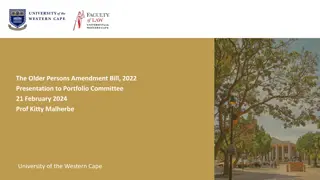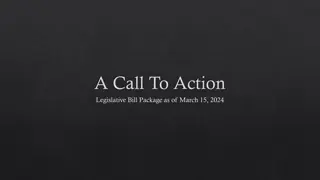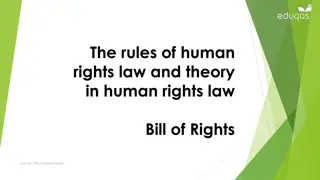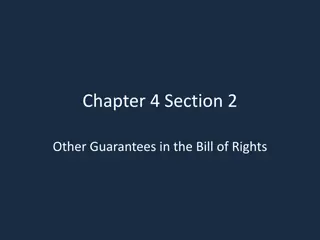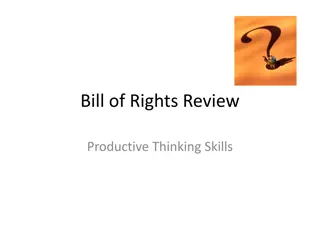The English Bill of Rights: Definition and Impact
The 1689 English Bill of Rights was a pivotal British law passed after the Glorious Revolution of 1688. It outlined the rights and liberties of people, limiting the monarchy's power and establishing a constitutional monarchy in Great Britain. The Bill influenced constitutional developments in North America and the United States.
Download Presentation

Please find below an Image/Link to download the presentation.
The content on the website is provided AS IS for your information and personal use only. It may not be sold, licensed, or shared on other websites without obtaining consent from the author. Download presentation by click this link. If you encounter any issues during the download, it is possible that the publisher has removed the file from their server.
E N D
Presentation Transcript
The Bill of Rights Dr.AGHALYA.,M.A.,M.Ed.,M.PHIL., Dr.AGHALYA.,M.A.,M.Ed.,M.PHIL.,Ph.D Head & Head & Asst.Professor Asst.Professor Department of History Department of History Bon Secours College for Women Bon Secours College for Women Thanjavur Thanjavur Ph.D., .,
Definition of the English Bill of Rights of 1689 The Meaning and Definition of the English Bill of Rights: The 1689 English Bill of Rights was a British Law, passed by the Parliament of Great Britain in 1689 that declared the rights and liberties of the people and settling the succession in William III and Mary II following the Glorious Revolution of 1688 when James II was deposed. The date of the English Bill of Rights is referred to as either dated as March 1689 or as February 13, 1688 in Old Style dating.
The English Bill of Rights The English Bill of Rights clearly established that the monarchy could not rule without consent of Parliament. The English Bill put in place a constitutional form of government in which the rights and liberties of the individual were protected under English law. The English Bill of Rights had a great influence on the colonies in North America and the Constitution of the United States.
The English Bill of Rights The English Bill of Rights established a constitutional monarchy in Great Britain. A constitutional monarchy is one in which the King or Queen has a largely ceremonial position. It is a form of government in which a monarch acts as head of state but their powers are defined and limited by law. Constitutional monarchies employ a parliamentary system with a Prime Minister as head of the government. The English Bill denounced King James II for abusing his power and the bill was passed as British law in December 1688.
The Provisions of the English Bill of Rights The English Bill of Rights followed the 1688 Glorious Revolution when King James II was replaced by King William III and Mary. The provisions of this important English Bill incorporated the Declaration of Rights and consisted of: A list of the misdeeds of King James II Thirteen Articles confirming the rights of Parliament and the people and defining the limitations of the Crown Confirmation of the accession of William and Mary to the throne of England
The Magna Carta and the English Bill of Rights The 1689 English Bill of Rights is one of the two great historic documents which regulate the relations between the Crown and the people, the other document being the 1215 Magna Carta of England.
The Magna Carta started the process of establishing the democratic basis of the English Monarchy by: Limiting the powers of the king Laying the basis for due process of law that should be known and orderly (which led to Trial by Jury) Prohibiting the king from taking property or taxes without consent of the Great Council 1215 Magna Carta Text and Words The 1689 English Bill of Rights enhanced the democratic process by: Guaranteeing free elections and frequent meetings of Parliament Giving English people the right to complain to the king or queen in Parliament (Free Speech) Forbidding excessive fines and cruel punishment



